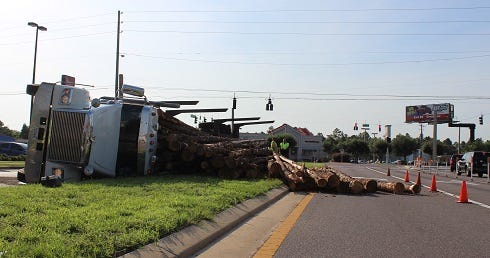
There have been two traffic accidents involving log trucks within the past month, sparking inquiry into why the trucks are plodding through town, using primarily residential roads.
"My grandfather was killed by a log truck," said Mayor Guy Thompson. "Logs fell off the truck and rolled over him. It's always been a fear. I want to make sure what's coming through town is safe."
Thompson said he will be looking into the situation and the circumstances surrounding log trucks traveling through town. Perhaps, there can be a way to ensure a safe route through the city, he said.
"I think we're going to have to require they be better secured," Thompson said. "We may have to meet with the logging companies."
Thompson said the idea would be to find the best route with the least hindrance to the truckers, while ensuring a safe route for the public. The truck that spilled logs last month shut down traffic for hours. He suggested a coordinated effort with state officials could prompt inspections of the loaded log trucks as they roll through town.
"Unless a road has a weight restriction on it, there's nothing that prohibits it," said Florida Highway Patrol Lt. Jeff Ross. "It's a public road."
Municipalities, such as the city and the county have the authority to regulate and restrict commercial traffic through various methods, according to Ross. They have the power to set lower weight limits and speed limits for trucks. In some areas, there may be a need for a height restriction.
The regulation of county roads ultimately falls under the discretion of the Board of County Commissioners, according to County Attorney Angela Jones. If a person, group or entity saw a potential issue with a roadway, the commissioners could look into the situation and take action by restricting a roadway if they deemed necessary.
A majority of the log trucks are headed to International Paper, using county roads such as Berryhill Road, Willard Norris Road and Chumuckla Highway, according to Assistant Public Works Director Stephen Furman. He stands confident that the public infrastructure can handle the weight of log trucks.
"They can handle all legal weight loads," Furman said. "The county prefers to keep the trucks on our major arterial roadways."
These major arterial roadways, such as Chumuckla Highway and Berryhill Road were originally state highways, but were given to the county in the 70s, according to Furman. The roads have been resurfaced and the infrastructure is capable of handling the loads, up to 80,000 pounds or more of a log truck. The layers of new pavement have strengthened the existing pavement, adding to overall durability.
Ross, of the FHP, says some log trucks weigh more than the 80,000 pound weight limit. Drivers may purchase a permit, not applicable to interstate use, for $250. The permit allows for drivers to carry an additional 8,000 pounds.
The FHP does patrol the trucking industry through a commercial vehicle office, using a set of portable scales to weigh trucks on the spot. Log trucks can vary in weight, due to the irregularities of lumber in size and moisture content, Ross said.
The heavier a vehicle, the more damaging it is to infrastructure, so log truckers pay the additional fees in licensing and tagging, according to Furman. The fees are there to offset the maintenance costs of having heavier vehicles on the road.
Furman said it would be costly for trucks to use any other routes to reach their destination, say using the interstate or Highway 90. The additional time and money would be detrimental to truckers in the area. He said a more direct route means less time on the road, and less potential for accidents.
"With the price of diesel fuel at $4 a gallon, as long as they're legal weight, they're going to take the shortest route," Furman said. "If you start regulating the routes that somebody takes, it adds more time, and more wear and tear directly. It's also less money if they get one less road to travel a day. Then you're cutting into timberland profits."
Some roads in the county are restricted to truck usage, according to Furman. Wallace Lake Road, off of Chumuckla Highway in Pace, is posted with no through trucks. It used to be a dirt road right through the middle of International Paper property. The road was paved and the surrounding area was developed with homes, leading to the residents petitioning the commissioners for trucking regulations.
The commissioners agreed with the petition, and restricted truck access to Wallace Lake Road. Furman said he would challenge someone to find an alternate route for these log trucks. He said if they could demonstrate a better route, the commissioners would certainly look at viable options.
It comes down to commerce and the economy, says Furman. He said the frequency of recent accidents involving log trucks was likely coincidental.
"It's one of those things, when it rains, it pours," Furman said. It's probably been quite a number of years. Coincidences happen, with having two of them in a very short period of time."
This article originally appeared on Santa Rosa Press Gazette: Mayor wants to ensure log trucks safe
